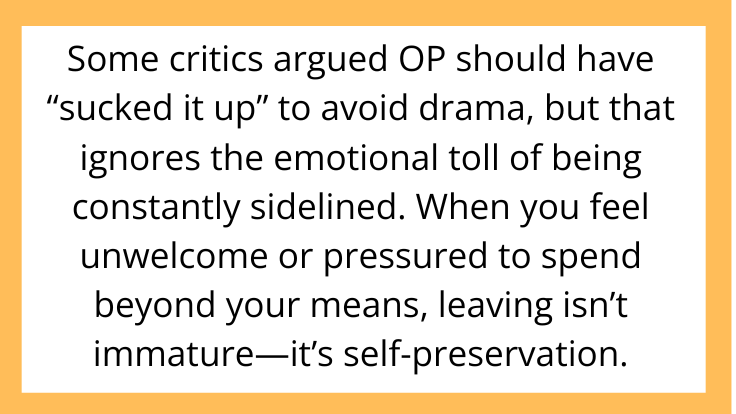AITAH for Leaving a Group Vacation Early Because No One Considered My Budget?
Group vacations sound like a dream—sun, laughs, and unforgettable memories. But when budgets, personalities, and priorities clash, that dream can quickly turn into frustration. One Redditor recently asked the r/AITAH community if they were wrong for ditching a friend vacation early after being repeatedly excluded from decisions because of their smaller budget.
This story sparked a wave of responses about friendship, financial respect, and the importance of setting personal boundaries—even when it means walking away.
Let’s explore what happened, why it hit a nerve, and how you can handle similar situations with clarity and confidence.
The Scenario: Group Trip Turns into a Financial Nightmare

The original poster (OP) explained they had been invited on a weeklong vacation with five friends. From the beginning, they made their budget clear: they could contribute to the basics—accommodation, shared groceries, and one or two meals out—but they weren’t comfortable splurging every day.
Despite this, the group booked an expensive beachfront villa, dined out every night, and planned costly activities like jet skiing, spa days, and bottle service at beach clubs. OP found themselves opting out of many events or joining awkwardly and feeling pressured. When they suggested budget-friendly alternatives, they were ignored or brushed off.
Halfway through the trip, OP packed up and left.
Their friends were stunned and called OP “dramatic” and “selfish” for “ruining the vibe.” Now OP was wondering: Am I the a**hole for prioritizing my comfort over the group experience?
The Truth About Group Travel: Compatibility Is Everything

Planning a group vacation isn’t just about picking a destination—it’s about aligning expectations. And money is one of the biggest pressure points. Here’s why situations like OP’s are more common than you think:
-
Unspoken expectations: Friends may assume everyone is on the same financial wavelength without asking.
-
Fear of conflict: People often avoid money talks, hoping it’ll “work itself out.” It rarely does.
-
Invisible exclusion: Being left out of activities (or forced to join at your own expense) feels alienating.
In OP’s case, their desire for affordable fun was treated as a burden rather than a boundary. That’s not just inconsiderate—it’s unsustainable for friendships.
Is Walking Away the Best Option?

Some critics argued OP should have “sucked it up” to avoid drama, but that ignores the emotional toll of being constantly sidelined. When you feel unwelcome or pressured to spend beyond your means, leaving isn’t immature—it’s self-preservation.
Here’s why OP’s choice to leave early made sense:
-
Financial boundaries are valid. You shouldn’t go into debt to maintain appearances or please others.
-
Disrespect erodes trust. If your friends ignore your needs repeatedly, that’s not a healthy dynamic.
-
Peace over pressure. Sometimes, removing yourself from a toxic environment is the most responsible thing you can do.
How to Prevent Group Trip Disasters

If you’re planning or joining a group trip, these tips can help avoid scenarios like OP’s:
1. Talk About Budgets Early
Before booking anything, have an honest conversation. Ask questions like:
-
What’s everyone comfortable spending per day?
-
Should we split accommodations equally or by room size?
-
Are we prioritizing eating out or cooking?
2. Choose Flexible Itineraries
Not everyone needs to do every activity together. Offer both free and paid options so no one feels left out.
3. Respect Boundaries Without Judgment
If someone says, “That’s out of my budget,” believe them. Don’t tease, pressure, or shame. Respect earns loyalty.
4. Be Inclusive with Planning
Use group chats or polls so all voices are heard. If one friend is always ignored, it’s not a group trip—it’s a takeover.
What the Internet Thought
Responses on Reddit were largely in OP’s favor. Most users said they were right to leave, especially after clear communication was ignored. Others shared similar stories—proof that group travel often fails because people don’t align on money and priorities.
Some suggested that OP find travel partners who share their values in the future. “It’s not about how much you spend,” one commenter wrote, “it’s about feeling like your presence matters.”
Final Thoughts: Your Budget, Your Boundaries

Leaving a group trip isn’t easy. It comes with guilt, judgment, and emotional fallout. But staying in a situation where you’re disrespected—financially or emotionally—can hurt more in the long run.
Setting boundaries, especially around money, doesn’t make you selfish. It makes you self-aware.



